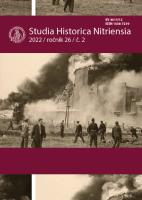Patterns of vernacular conflicts in medieval and early-modern towns of historical Upper Hungary
Patterns of vernacular conflicts in medieval and early-modern towns of historical Upper Hungary
Author(s): István KollaiSubject(s): History, Ethnohistory, Social history, Ethnic Minorities Studies
Published by: Univerzita Konštantína Filozofa v Nitre, Filozofická fakulta
Keywords: inter-ethnic relations; nationalism; emotions; interests; vernacular languages;
Summary/Abstract: Along the history of Central and Eastern Europe, a great variety of intercultural conflicts has been emerged in this region, among which a special form of conflict is embodied by tensions between vernacular language groups within medieval and early modern urban communities. Despite many valuable research results, the question of pre-modern vernacular conflicts is generally on the periphery of academic interest; while particular urban histories have explored much around these events, a general conceptualization seems to be lacking. This paper attempts to contribute to the academic discourse with a conceptualization, trying to clarify the specifics of these pre-modern vernacular urban conflicts in a comparativ way: ie. comparing them with modern nationalisms. As a result, it is concluded that pre-modern tensions between vernaculars were driven both by differing interests and emotions of the parties – like in case of modern nationalisms – but, unlike modern nationalisms, they lacked an intellectual motive. This lack of intellectual motives is embodied in the non-participation of circles of people-of-letters in these conflicts and in the apparent absence of explanatory (ideologizing) narratives that could provide more abstract reasons for situational contradictions than pure conflicts of interest or emotional hatred and distrust.
Journal: Studia Historica Nitriensia
- Issue Year: 26/2022
- Issue No: 2
- Page Range: 305-329
- Page Count: 25
- Language: English

